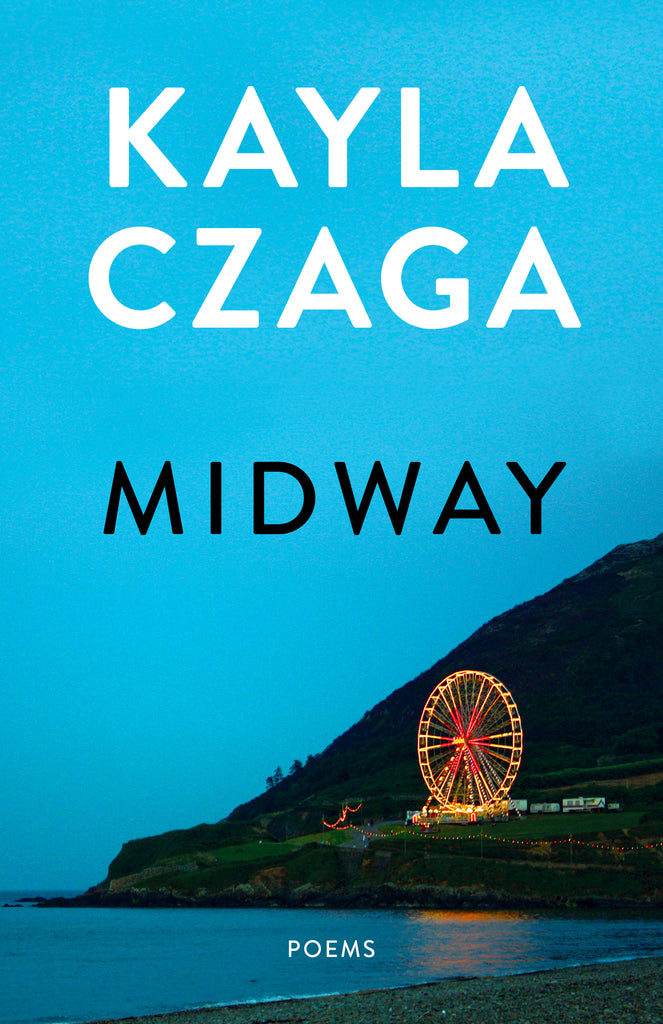Honest, elegiac, characteristically strange, and frequently funny, Midway is an exploration of grief in all its manifestations.
“I feel like the crud / I accidentally touch sometimes, whatever it is / that collects under cushions on my couch,” writes Kayla Czaga in her third collection, Midway, an exploration of grief in all its manifestations. In her search for meaning in the aftermath of her parents’ deaths, Czaga visits the underworld (at least twice), Vietnamese restaurants, the beach, London’s Tate Modern, Las Vegas casinos, and a fish textbook. Honest, elegiac, characteristically strange, and frequently funny, these poems take the reader through bright scenery like carnival rides with fast climbs and sudden drops. The meanings and messages Czaga uncovers on her travels are complicated: hopeful, bleak—both comforting and not. Along with the parents the poet mourns, this collection showcases a varied cast. A suburban father-in-law copes with a troubling diagnosis. Marge Simpson quits The Simpsons. Death is a metalhead who dates girls too young for him. Midway is a welcome and necessary collection from one of the most celebrated and accomplished poets of her generation.
Honest, elegiac, characteristically strange, and frequently funny, Midway is an exploration of grief in all its manifestations.
“I feel like the crud / I accidentally touch sometimes, whatever it is / that collects under cushions on my couch,” writes Kayla Czaga in her third collection, Midway, an exploration of grief in all its manifestations. In her search for meaning in the aftermath of her parents’ deaths, Czaga visits the underworld (at least twice), Vietnamese restaurants, the beach, London’s Tate Modern, Las Vegas casinos, and a fish textbook. Honest, elegiac, characteristically strange, and frequently funny, these poems take the reader through bright scenery like carnival rides with fast climbs and sudden drops. The meanings and messages Czaga uncovers on her travels are complicated: hopeful, bleak—both comforting and not. Along with the parents the poet mourns, this collection showcases a varied cast. A suburban father-in-law copes with a troubling diagnosis. Marge Simpson quits The Simpsons. Death is a metalhead who dates girls too young for him. Midway is a welcome and necessary collection from one of the most celebrated and accomplished poets of her generation.
| Published By | House of Anansi Press Inc — Apr 2, 2024 |
| Specifications | 88 pages | 5.5 in x 8.5 in |
|
Supporting Resources
(select item to download) |
Excerpt |
| Written By |
KAYLA CZAGA is the author of two previous poetry collections—For Your Safety Please Hold On (Nightwood Editions, 2014), and Dunk Tank (House of Anansi, 2019). Her work has been shortlisted for the Governor General’s Award for poetry and the Dorothy Livesay Poetry Prize. Frequently anthologized in the Best Canadian Poetry in English series, her writing also appears in The Walrus, Grain, Event, The Fiddlehead, and elsewhere. She lives with her wife on the traditional territory of the Lekwungen people, the Songhees nd Esquimalt nations. |
| Written By |
|
KAYLA CZAGA is the author of two previous poetry collections—For Your Safety Please Hold On (Nightwood Editions, 2014), and Dunk Tank (House of Anansi, 2019). Her work has been shortlisted for the Governor General’s Award for poetry and the Dorothy Livesay Poetry Prize. Frequently anthologized in the Best Canadian Poetry in English series, her writing also appears in The Walrus, Grain, Event, The Fiddlehead, and elsewhere. She lives with her wife on the traditional territory of the Lekwungen people, the Songhees nd Esquimalt nations. |
Midway is funny, genuine, and well written. Czaga offers a fitting and vulnerable elegy for her parents and a harrowing meditation on her life in the aftermath.
A lyric force, taking on grief in molecular detail. I love these poems.
” —Souvankham Thammavongsa, author of How to Pronounce Knife“Then I got into the poem– / it doesn’t matter which poem– / and let it take me / wherever it was going,” Kayla Czaga concludes in her powerful elegy, “Dad Poem,” and I found myself making this allowance as well throughout the brilliant lyric poems of Midway. There’s a lot of discussion of dinosaur erotica but, sadly, little actual dinosaur erotica. Instead the poet shows a sprightly imagination formed as much from the ebullience of fanfiction as the “seven hundred Romantic poems” she studied in school (merely learning “how to flirt with lakes”). But Keats in the Internet age would still have been Keats, just a Keats who wrote some Hanson fanfiction at some point. He would have perhaps written, as Czaga does, a poem called “The Sadness of Marge Simpson,” though this one is better because it’s real, and in this tremendous book: “my dad didn’t actually die / but has been in China this whole time / gawking at the Great Wall like he always wanted / and maybe Marge Simpson is with him, / having finally divorced her declining franchise.” To a reader facing one’s own declining franchises, Czaga’s Midway offers a glimpse at how, through the paired problems of the presence of parents and their absences, one's imagination and self might still grow.
” —Ed Skoog, author of Travelers Leaving for the City
